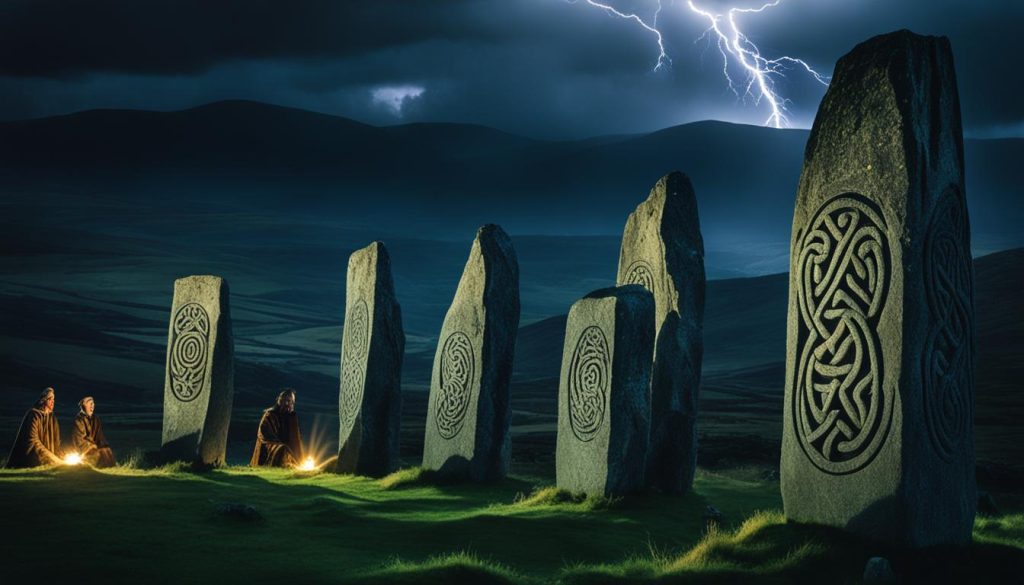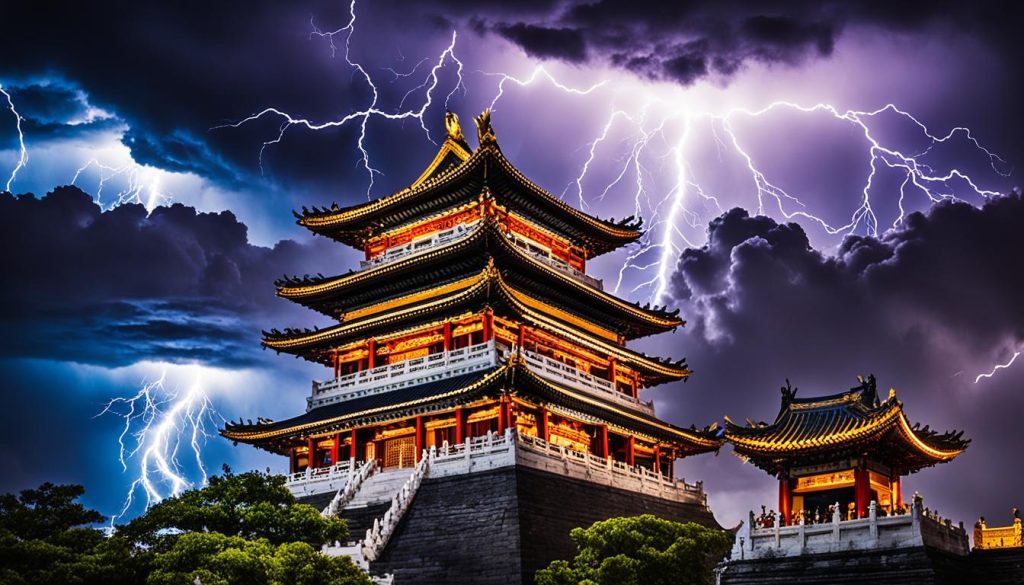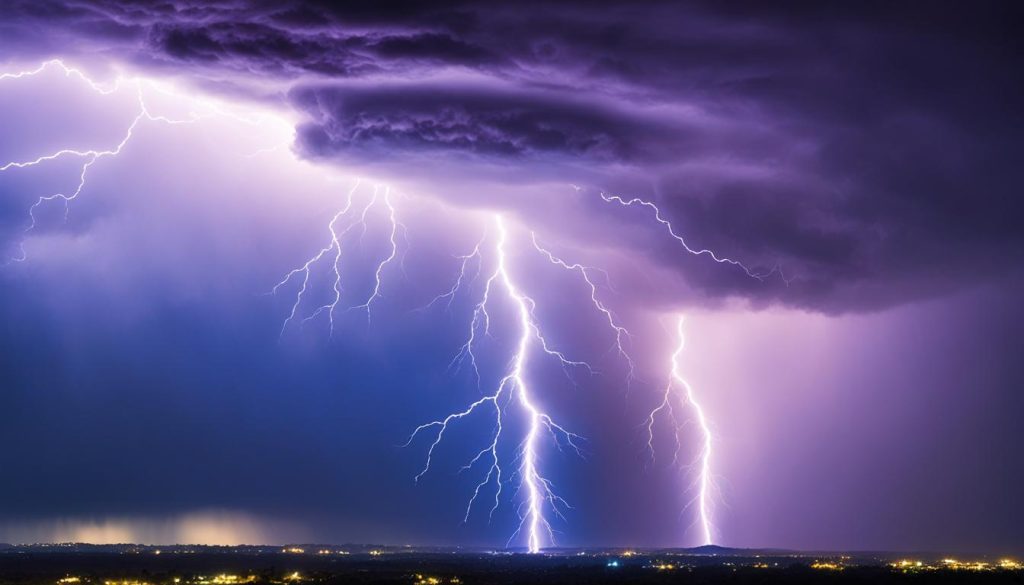Lightning, with its powerful and mesmerizing display, holds deep symbolic meanings across various cultures and belief systems. It represents more than just a natural phenomenon; it is a symbol of power, clarity, sacredness, fertility, creativity, revelation, destruction, enlightenment, and announcements. The symbolic representation of lightning has captivated the human imagination for centuries, inspiring art, mythology, and even scientific breakthroughs.
In different cultures, lightning is associated with different symbolic meanings. For the Celts, lightning was considered a sacred sign, and its striking points were revered as points of contact with overwhelming power. In Native American culture, lightning is closely linked to the thunderbird, symbolizing truth and integrity. In Chinese mythology, lightning represents fertility and the regenerative power of nature. Greek mythology attributes lightning to Zeus, symbolizing strength, intellect, and inspiration.
Key Takeaways:
- Lightning is a powerful symbol representing various meanings across cultures and belief systems.
- The Celts regarded lightning as sacred, while Native Americans saw it as a symbol of truth.
- In Chinese mythology, lightning is associated with fertility and regenerative power.
- Greek mythology attributes lightning to Zeus, symbolizing strength and inspiration.
- Understanding the symbolism of lightning enriches our appreciation of its profound impact throughout history.
Lightning as a Metaphor
Lightning, with its electrifying power and dazzling display, serves as a captivating metaphor for the depth and intensity of human emotions. When we witness the crackling bolts streak across the sky, we can’t help but feel a range of emotions, from fear and astonishment to reverence and inspiration. Lightning has a unique ability to tap into our primal instincts and stir something deep within us, creating a visceral and profound experience.
As a metaphor, lightning symbolizes the potency and raw energy of our emotions. It represents the swift and powerful surges of our feelings, capable of illuminating our innermost thoughts and desires with striking clarity. Just as lightning can strike in an instant, our emotions can be sudden and powerful, leaving a lasting impact.
“Like bolts of lightning, our emotions can pierce through the darkness and reveal what lies hidden within.”
When we use lightning as a metaphor, we are drawing upon its symbolic meaning to convey the heightened emotional states that humans experience. It serves as a reminder of the forceful nature of our feelings, allowing us to better understand and communicate the intensity of our emotional experiences.
Moreover, lightning can also be seen as a representation of the unpredictability and volatility of our emotions. Just as lightning can strike without warning, our feelings can surge forth unexpectedly, catching us off guard. This metaphor invites us to embrace the exhilaration and unpredictability that comes with experiencing intense emotions.
Emotional Significance of Lightning
Lightning holds great emotional significance, evoking awe, excitement, and even fear. The electrifying sight of lightning illuminates our surroundings and stimulates our senses, triggering a surge of emotions within us. It taps into our primal instincts, reminding us of both the power and fragility of our existence.
Lightning’s emotional impact can vary depending on the context and individual experiences. For some, it may symbolize a burst of inspiration or creativity, sparking a surge of ideas and possibilities. For others, it may evoke a sense of vulnerability and insignificance in the face of nature’s immense power. Regardless of our individual reactions, there is no denying the emotional resonance that lightning holds for humanity.
The Symbolic Meaning of Lightning as a Metaphor
As a metaphor, lightning carries a range of symbolic meanings. Its electric energy can represent passion, intensity, and sudden change. The inescapable brightness of lightning symbolizes revelations, breakthroughs, and moments of enlightenment. It serves as a vivid reminder of the inherent power and potential that exist within us, waiting to be unleashed.
Just as lightning can illuminate the darkest of skies, this metaphor reminds us that our emotions have the power to shed light on our deepest fears, desires, and truths. Like a thunderous bolt that reverberates through the atmosphere, our emotions have the capacity to provoke significant shifts in our lives and relationships.
| Symbolic Meanings of Lightning as a Metaphor |
|---|
| Intensity and passion |
| Sudden change and transformation |
| Revelations and moments of enlightenment |
| Power and potential |
Celtic Beliefs Around Lightning
The ancient Celts held lightning in great reverence, considering it a sacred force that embodied immense power and connection to the divine. In Celtic culture, lightning was believed to be a direct sign from the gods, symbolizing their presence and influence in the mortal realm.
When lightning struck a particular spot, the Celts considered it a sacred space, a point of contact with the unfathomable power of the gods. These lightning-kissed locations were regarded as places of worship and reverence, where the Celtic people would gather to honor and connect with the divine forces.
Interestingly, the Celts believed that anyone struck by lightning was touched by the gods themselves, regardless of the outcome. Whether the person survived or transitioned to the afterlife, being struck by lightning was seen as a powerful sign of the divine touch and connection.
Lightning played a significant role in Celtic culture, embodying concepts of connection and power. It served as a bridge between the mortal and the divine, representing the awe-inspiring forces that governed the world. The sacredness of lightning in Celtic beliefs speaks to the reverence and deep spiritual connection that the Celts had with the natural world and the supernatural realm.
Celtic Beliefs About Lightning
| Celtic Beliefs | Significance |
|---|---|
| Sacredness of Lightning | Lightning was considered highly sacred and embodied immense power. |
| Points of Contact | Spots struck by lightning were viewed as contacts with the divine. |
| Places of Worship | Locations where lightning struck became sacred spaces for worship. |
| Divine Touch | Being struck by lightning was seen as a sign of the gods’ touch. |
| Connection and Power | Lightning symbolized the connection and power of the divine forces. |

Native American Lightning
In Native American wisdom, lightning holds profound symbolism and is closely connected with the thunderbird. The thunderbird, a mythical creature believed to emit lightning bolts from its eyes, represents honesty, truth, and morality. According to tribal legends, lightning serves as a divine tool that strikes down those who misguide, mislead, or withhold the truth.
In the rich tapestry of Native American culture, lightning acts as a potent symbol of justice and integrity, encouraging individuals to embrace honesty and adhere to the principles of truth. It serves as a reminder of the inherent power and sacredness of speaking and living in alignment with one’s values.
Just as lightning illuminates the darkness and reveals what lies concealed, it metaphorically brings clarity and transparency to the realm of human interactions. Native Americans conceptualize lightning as a force that upholds the integrity of the community, ensuring that truth prevails and falsehoods are exposed.
The Thunderbird and Lightning’s Justice
In Native American mythology, the thunderbird is often regarded as a divine entity that governs the skies and commands the power of lightning. It is believed that the thunderbird, with its ability to control and unleash lightning, functions as an enforcer of justice and a protector of truth.
This deeply ingrained association between the thunderbird and lightning reflects the reverence Native American tribes hold for the moral compass and the symbolic significance of truth in their culture. Lightning acts as a vessel through which the divine forces admonish those who stray from the path of honesty and justice, reinforcing the importance of maintaining the integrity of the community.
By embracing lightning as a symbol of truth, Native Americans honor their ancient traditions and highlight the crucial role transparency plays in fostering a just and harmonious society.
Embracing the Power of Lightning
Native American communities, guided by the symbolism of lightning, recognize the transformative power of embracing truth and living authentically. Lightning’s potency serves as inspiration to tap into and harness the inner strength required to navigate life with integrity and uphold the values that define individuals and communities.
The sacredness and truth embodied by lightning transcend cultural boundaries, reminding us of the universal human desire for justice, morality, and transparency. Native American wisdom invites us to reflect on the symbolic depth of lightning and consider how we can embody its essence in our own lives.
Lightning in Chinese Myths
In Chinese mythology, lightning carries deep symbolism, particularly in its association with fertility. It is believed that lightning is closely connected to the nourishing rains that are essential for the growth of crops and agriculture. The regenerative power of lightning is celebrated as it initiates the process of rain, which provides the life-giving water needed for bountiful harvests and fruitful lands.
One of the most revered philosophical texts in Chinese culture, the Tao Te Ching, references lightning in relation to fertility. Lightning is depicted as an agent of transformation, opening the womb and bringing forth new life. This portrayal emphasizes lightning’s role not just as a natural phenomenon, but as a catalyst that enables the cycle of life to continue.
In Chinese culture, lightning is seen as a blessing and a cause for celebration. It represents the regenerative force of nature and the hope for abundance and prosperity. The powerful imagery of lightning serves as a reminder of the cyclic nature of life and the transformative power it holds.
To illustrate the significance of lightning in Chinese mythology, consider the following table:
| Symbolism | Description |
|---|---|
| Fertility | Lightning is seen as a symbol of fertility, connected to nourishing rains that support agriculture. |
| Regenerative Power | Lightning is believed to initiate the process of rain, which is crucial for agricultural productivity and the cycle of life. |
| Celebration | Lightning is perceived as a blessing and a cause for celebration, symbolizing abundance and prosperity. |
Through these symbolic associations, lightning holds a special place in Chinese mythology, reminding us of the profound connection between nature, fertility, and the regenerative forces that sustain life.

Lightning in Greek Myth
Greek mythology holds lightning symbolism in high regard, particularly in association with Zeus, the ruler of the gods. Zeus is famously depicted as wielding thunderbolts, and lightning represents his strength, intellect, and command over powerful ideas. In Greek culture, lightning also carries a deeper symbolic meaning, representing intuition and spiritual illumination.
Lightning in Greek mythology embodies the fusion of seemingly opposite elements within the human psyche, such as fire and water. It serves as a powerful symbol of the transformative force that arises from the union of these elements. Just as lightning breaks through the darkness, it inspires epiphanies and breakthrough ideas that ignite the fires of creativity and spiritual awakening.
Symbolic Significance: Strength and Inspiration
The association of lightning with Zeus signifies his immense power and serves as a reminder of the strength that lies within all individuals. Lightning’s symbolic representation of strength and inspiration resonates deeply in Greek culture, inspiring awe and admiration for Zeus’ might.
In Greek mythology, the thunderous roar of lightning echoes the immense power and force of Zeus, inspiring the belief in his unmatched strength.
Furthermore, lightning’s union of fire and water in Greek symbolism underscores the harmonious balance between seemingly contradictory forces. This union represents the convergence of passion and emotion (fire) with wisdom and rationality (water), highlighting the multifaceted nature of the human spirit.
| Symbolic Meanings of Lightning in Greek Mythology | Examples |
|---|---|
| Strength and Power | Zeus wields thunderbolts to showcase his dominion over the gods and mortals. |
| Inspiration and Epiphany | Lightning serves as a catalyst for transformative ideas and breakthroughs. |
| Spiritual Illumination | The metaphorical radiance of lightning symbolizes spiritual awakening and a connection to divine wisdom. |
Lightning in Greek mythology embodies the extraordinary strength and inspiration that fuel human potential, illuminating the path to greatness and offering a glimpse into the realm of the divine.
Lightning as Inspiration
Throughout history, lightning has served as a powerful source of inspiration for inventors and thinkers. One individual who harnessed this inspiration and made groundbreaking discoveries was Benjamin Franklin.
Franklin’s experiments with lightning led to the invention of the lightning rod, a device that revolutionized electrical engineering.
By conducting experiments and establishing the connection between lightning and electricity, Franklin paved the way for significant advancements. The lightning rod, designed to protect buildings from being struck by lightning, showcased the practical applications of harnessing the power of this natural phenomenon.
The invention of the lightning rod not only demonstrated Franklin’s ingenuity but also sparked a new era in the field of electrical engineering. It provided a practical solution to a potentially destructive force and paved the way for further exploration and understanding of electricity.
“The invention of the lightning rod by Benjamin Franklin was a stroke of genius, both literally and figuratively.”
Franklin’s work with lightning serves as a testament to the inspirational nature of this powerful force. It represents the ability to have breakthrough ideas and make significant advancements in various fields. Lightning’s awe-inspiring qualities continue to captivate inventors and thinkers, pushing the boundaries of human knowledge and sparking innovative solutions.
Superstitions Surrounding Lightning
Lightning has sparked a multitude of superstitions across different cultures, highlighting the perceived power and mystique surrounding this natural phenomenon. From beliefs about lightning and trees to its association with house fires and even healing properties, superstitions related to lightning showcase the intriguing ways in which humans have interpreted and responded to this awe-inspiring force of nature.
Beliefs about Lightning and Trees
In England, folklore debates the best tree to seek refuge from lightning. It is believed that oak trees attract lightning, while holly trees have the ability to repel it. This longstanding belief has led to the superstition of seeking shelter under specific trees during thunderstorms, depending on their perceived interaction with lightning.
Lightning and House Fires
In the United States, there is a superstition that burning wood struck by lightning in a fireplace invites lightning to strike the house. However, an accompanying belief suggests that opening windows during a thunderstorm allows the energy of lightning to escape, thus preventing damage to the house. These opposing beliefs reflect the fear and caution associated with lightning’s potential threat to homes and the measures taken to avoid disaster.
Healing Properties of Lightning-Struck Objects
French legend suggests that remnants of a lightning strike, such as charred wood or stones, possess healing properties when placed on open wounds. This superstition is rooted in the belief that the intense energy of lightning can imbue objects with supernatural qualities that aid in the healing process. While scientific evidence does not support this belief, it speaks to the enduring fascination with lightning and its perceived connection to extraordinary powers.
These superstitions related to lightning demonstrate the deep-rooted cultural significance and awe-inspiring qualities associated with this natural phenomenon. The interplay between beliefs about lightning and trees, the association of lightning with house fires, and the healing properties of lightning-struck objects all contribute to the rich tapestry of human superstitions surrounding lightning.
References:
- Smith, J. (2018, June 20). Folklore Thursday: Folk Beliefs and Superstitions about Lightning. The Folklore Podcast. Retrieved from https://www.thefolklorepodcast.com/
- Black, S. (2019, March 25). Lightning Folklore & Superstitions. WeatherWorks. Retrieved from https://www.weatherworksinc.com/news/lightning-folklore-superstitions
- Hainsworth, S. (2018, May 8). 10 Fascinating Superstitions From Different Cultures Explained. Escapism Magazine. Retrieved from https://escapismmagazine.com/article/superstitions/
Conclusion
Lightning symbolism holds significant meanings across various cultures and mythologies. It represents a wide range of concepts, including power, clarity, sacredness, fertility, creativity, revelation, destruction, enlightenment, and announcement. Different cultures have associated lightning with different symbolic meanings, showcasing its universality and timeless significance.
From the Celtic belief in the sacredness of lightning to the Native American association with truth and morality, lightning has played a pivotal role in shaping cultural beliefs and practices. Chinese mythology sees lightning as a symbol of fertility and regenerative power, while Greek mythology connects it to strength, intellect, and inspiration. The symbolic impact of lightning has also extended to inspiring inventors, such as Benjamin Franklin and the invention of the lightning rod.
Furthermore, lightning has been the subject of various superstitions, highlighting the awe and mystery surrounding its power. Beliefs about lightning and trees, the healing properties of lightning-struck objects, and the precautions taken during thunderstorms all demonstrate the influence of lightning in shaping cultural practices and beliefs.
In conclusion, understanding the symbolism of lightning allows us to appreciate its profound impact on different cultures and mythologies throughout history. It serves as a powerful and universal symbol, capturing human emotions, inspiring creativity, and representing fundamental aspects of life. The significance of lightning in various cultural contexts underscores its enduring relevance and timeless fascination.
FAQ
What are the different symbolic meanings of lightning?
Lightning holds various symbolic meanings across different cultures and belief systems, including power, clarity, sacredness, fertility, creativity, revelation, destruction, enlightenment, and announcement.
How is lightning used as a metaphor?
Lightning is often used as a metaphor to represent the potency and intensity of human emotions, tapping into our primal instincts and invoking feelings of fear, reverence, and inspiration.
How did the Celts view lightning?
The Celts regarded lightning as highly sacred and powerful. They established sacred spaces at the spots where lightning struck, considering them as points of contact with unfathomable power. Lightning symbolized connection, power, and the divine in Celtic culture.
What is the significance of lightning in Native American culture?
In Native American culture, lightning is closely associated with the thunderbird. The thunderbird represents honesty, truth, and morality, and lightning is believed to strike down those who misguide or withhold the truth. Lightning symbolizes justice and upholds the integrity of the community.
How is lightning symbolized in Chinese mythology?
Lightning is associated with fertility in Chinese mythology. It is believed to be connected to nourishing rains that are crucial for agricultural productivity. Lightning is seen as a regenerative force that brings forth new life and is celebrated as a blessing in Chinese culture.
What does lightning symbolize in Greek mythology?
In Greek mythology, lightning is associated with Zeus, who wields thunderbolts. Lightning represents Zeus’ strength, intellect, and inspiration. It symbolizes the fusion of seemingly opposite elements within the human psyche and inspires epiphanies and transformative ideas.
How has lightning served as inspiration?
Lightning has inspired inventors and thinkers throughout history. Benjamin Franklin, for example, conducted experiments with lightning that led to the invention of the lightning rod, revolutionizing electrical engineering. Lightning as inspiration represents breakthrough ideas and significant advancements in various fields.
Are there any superstitions surrounding lightning?
Yes, there are various superstitions related to lightning. For example, folklore suggests that certain trees attract or repel lightning. There are also beliefs about lightning causing house fires or possessing healing properties when objects struck by lightning are applied to open wounds.
What is the conclusion regarding lightning symbolism?
Lightning symbolism holds significant meaning in various cultures and mythologies. It encompasses power, clarity, sacredness, fertility, creativity, revelation, destruction, enlightenment, and announcement. Lightning has inspired people, played a role in superstitions, and continues to captivate our imaginations.



